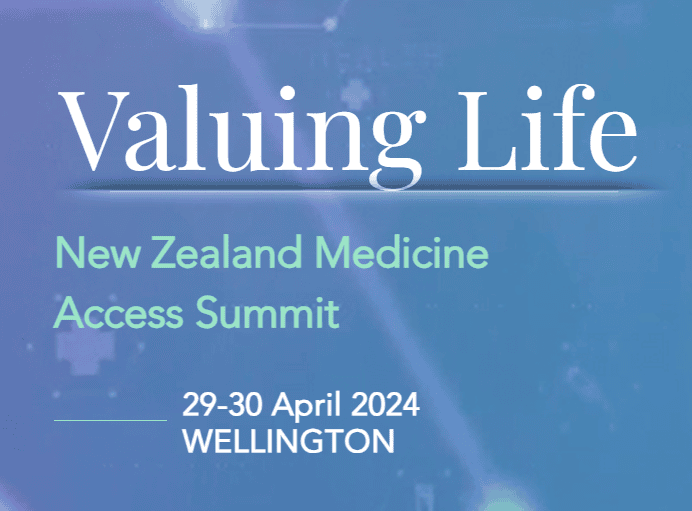The first-ever national event to discuss New Zealand’s woeful access to modern medicines was held in Wellington, 29-30 April, at Parliament and hosted by The Honorable David Seymour, Associate Minister of Health. Fiona Imlach and Suzanne Value from Migraine Foundation Aotearoa NZ attended. The event was organized by Patient Voice Aotearoa, a volunteer-run advocacy group campaigning for the rights of patients in NZ, and Medicines NZ, a coalition of pharmaceutical companies that regularly publish research highlighting how far behind the rest of the world NZ is in terms of access to medicines.
David
Seymour, while opening the Summit, took the opportunity to announce additional
funding for Pharmac, which had a lukewarm reception from advocates in the
room, as this extra funding was not enough to cover any new medicines, but only
keep existing medicines on the books.
The Summit
was appropriately named ‘Valuing Life’ and stories from patients painted a grim
picture of how lives were being lost, restricted and ripped apart by diseases for
which there are effective treatments elsewhere, but not here. Fiona
Tolich talked about how she, and others, have had to move to Australia to
access life-changing medicine. We heard how far NZ lagged behind the rest of
the OECD in terms of access to modern medicines – absolutely last, behind
Mexico, Lithuania and Hungary. Myths were busted – NZ can afford to pay for new
medicines but we choose to spend money on other things. Spending on medicines
is not a priority within the health budget, even though the economic benefits
from new and better medicines means that they may well pay for themselves, through
reduced costs elsewhere in the health system (e.g. hospital visits) and
increased tax revenue for the Government from patients and carers being able to
return to work.
The guest speaker
from the Netherlands, Dr Tim Kanters, talked about how to include broader, societal
perspectives into the economic analysis of new medicines, not just focus on the
impact and benefit to the health system, as Pharmac currently does. We were
delighted that Dr Kanters used the example of migraine to demonstrate how
important it was to consider costs and benefits to families and society, and productivity
costs from lost employment, in such analyses.
There was a
consensus amongst the advocates that more progress needed to be made in Pharmac’s
transparency, timeliness and engagement with consumers but the biggest barrier
to better access to medicines was that the budget allocated to medicines was
inadequate, not even enough to keep up with population growth, ageing and
inflation. It was immensely disappointing that the only MPs to attend the
Summit, held at Parliament, were the two Act MPs, David Seymour and Todd Stephenson
and NZ First health spokesperson Jenny Marcroft. Not a single showing from
National, Labour, Greens or Te Pāti Māori. The lack of bipartisan agreement
about the urgent need for improved medicines access in NZ signals a failure of
politicians to hear the voices of consumers and families who are losing lives,
livelihoods and quality of life because we do not have the same treatments
available to us as our peers in Australia, UK, Canada and the US.
We will continue
to support Patient Voice Aotearoa and any actions coming from the Medicines
Summit to improve medicines access in NZ. If you can, you can also support this
work by raising this issue with Members of Parliament. You can contact
your own MP, send a letter, an email or request a meeting, and you can also
write to the Ministers
currently responsible for health (as of May 2024, Shane Reti from the
National Party is Minister of Health, David Seymour from Act, Matt Doocey from
National and Casey Costello from NZ First are Associate Ministers of Health) and
the Ministers in other parties who are the health spokespersons (as of May
2024, Ayesha Verrall for Labour, Debbie Ngarewa-Packer for Te Pāti Māori, Hūhana
Lyndon for the Green Party). The message we want the politicians to hear is we
are waiting too long for medicines that would not only improve our lives and
wellbeing but would make us more able to engage productively with our families,
with work and in society in general. We, as voting constituents, want to see
more money spent on life-changing medicines. You may even have examples of why
you would prioritise medicines, and health care in general, over other things
that the Government is currently spending taxpayers’ money on. As one attendee
at the Summit observed, Pharmac, and the Government sets Pharmac’s budget, is
acting like an insurance agent that we all pay into, but when we go to make a
claim, we’re turned away and told there’s no compensation available. It’s just not
good enough.


